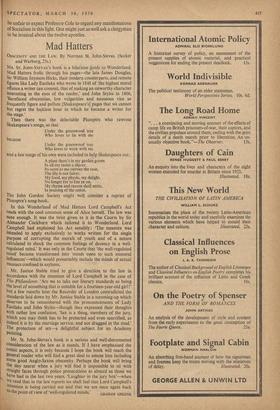Mad Hatters
MR. ST. JOHN-STEVAS'S book is a hilarious guide to Wonderland. Mad Hatters frolic through his pages—the late James Douglas, Sir William Joynson-Hicks, their modern counterparts, and remote figures like Lady Eastlake who wrote in 1848 of 'the highest moral offence a writer can commit, that of making an unworthy character interesting in the eyes of the reader,' and John Styles in 1806,
'Barefaced obscenities, low vulgarities and nauseous vice so frequently figure and pollute [Shakespeare's] pages that we cannot but regret the luckless hour in which he became a writer for the stage.'
Then there was the delectable Plumptre who rewrote Shakespeare's songs, so that
Under the greenwood tree Who loves to lie with me became Under the greenwood tree Who loves to work with me
and a few songs of his own were included to help Shakespeare out :
A plant there's in my garden grows In all my tastes a sharer.
Its scent to me (navies the rose, The lily is not fairer. My food, my physic, my delight, No longer for to fun ye on, My rhyme and reason shall unite. In praising of the onion,
The John Gordon Society might well consider a reprint of Plumptre's song-book.
In this Wonderland of Mad Hatters Lord Campbell's Act reads with the cool common sense of Alice herself. The law was sane enough. It was the twist given to it in the Courts by Sir Alexander Cockburn which tailored it to Wonderland. Lord Campbell had explained his Act sensibly : The measure was Intended to apply exclusively to works written for the single Purpose of corrupting the morals of youth and of a nature calculated to shock the common feelings of decency in a well- regulated mind.' It was only in the Courts that 'the well-regulated mind' became transformed into 'minds open to such immoral influences'—which would presumably include the minds of sexual maniacs confined in asylums.
Mr. Justice Stable tried to give a direction to the law in accordance with the intention of Lord Campbell in the case of The Philanderer. 'Arc we to take our literary standards as being the level of something that is suitable for a fourteen-year-old girl?' but a few months later the Recorder of London contradicted the standards laid down by Mr. Justice Stable in a summing-up which deserves to be remembered with the pronouncements of Lady Eastlake and John Styles—though they expressed their thoughts With rather less confusion. 'Sex is a thing, members of the jury, Which you may think has to be protected and even sanctified, as !ndeed it is by the marriage service, and not dragged in the mud.'
The protection of sex—a delightful subject for an Academy Painting.
Mr. St. John-Stevas's book is a serious and well-documented consideration of the law as it stands. If I have emphasised the comic aspects, it is only because 1 hope the book will reach the general reader who will find a great deal to amuse him including some good Anglo-Saxon obscenity. Perhaps the book will bring the day nearer when a jury will find it impossible to sit with Ntraight faces through police prosecutions as absurd as those we have had in the last two years. 'Laughter in the jury box'—when We read that in the law reports we shall feel that Lord Campbell's Intention is being carried out and that we are once again back 10 the point of view of 'well-regulated minds,' GRAHAM GREENE


































 Previous page
Previous page